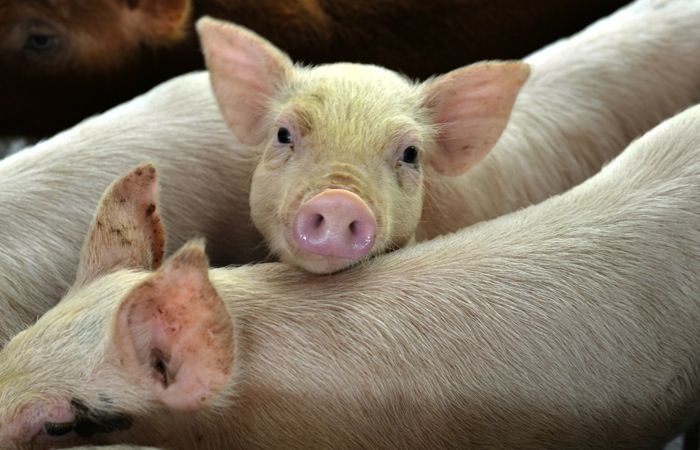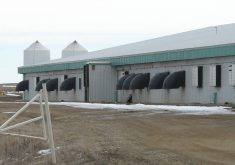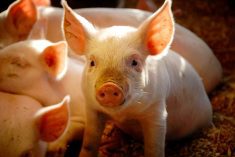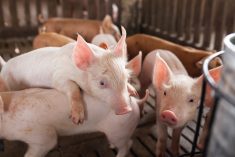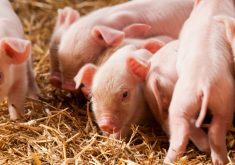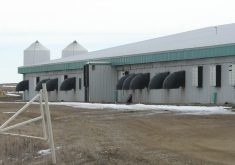Porcine epidemic diarrhea has spread to a fifth Manitoba hog barn with devastating effects.
“They’re seeing high mortality rates, in the order of 70 to 80 per cent in some cases,” said Andrew Dickson, general manager of the Manitoba Pork Council. “In the feeders barns, they’ve noticed it because it’s hurt production a bit… whereas in the sow barns, they’re noticing mortality.”
Some of the affected barns have seen death rates among piglets approaching 100 per cent, he added. Others have been lower.
Chief veterinary officer Megan Bergman confirmed the province’s fifth on-farm case of porcine epidemic diarrhea last week after receiving a report by the herd veterinarian as is required by provincial regulation. PEDv is a reportable disease in Manitoba. The province’s veterinary lab later verified the findings.
Read Also

Farmers flood Keystone Centre for Ag Days
Farmers, organizers and exhibitors are converging on the Keystone Centre at Brandon, Manitoba for the first of three days of Ag Days 2026.
How the virus arrived at this nursery finisher barn, which is located outside the five-km buffer zone containing the two previously confirmed cases, remains a mystery.
“What we don’t understand is why the outbreak occurred,” said Dickson, adding it will take time to track down where all the animals from the farm went to as well.
“We’re in the pretty early stages of the investigation, and right now we are following up on all of our leads in terms of movement on and off the farm and direct and indirect contact,” Bergman said.
But she added it’s not surprising that new cases of the virus are emerging at this time of year, noting the virus prefers cool, wet weather.
It’s here
This fact, combined with the knowledge that eight high-traffic or environmental sites have also tested positive for PED in the province, make it absolutely crucial that producers remain vigilant when it comes to biosecurity measures, the chief vet said.
“We need to continue to remember that we do have the virus in Manitoba, so the biggest piece we need to emphasize is that biosecurity is our best friend and we need to continue to be very vigilant in our practices, because that’s the best way we can keep it out of our barns,” Bergman said. “Know who is coming onto your farm, know where they were before coming onto your farm, and ensure that they haven’t had any exposure to high-traffic sites… or another barn, or an assembly yard, and these are all pieces that are important.”
That means making sure any visitors — from trades people such as electricians or carpenters, to couriers, to family and friends — follow strict biosecurity protocols, she said.
“You could be located somewhere with a dozen hog barns in the area, but everybody practises super-high biosecurity and… you’re perfectly safe,” said Dickson.
Meticulous attention
That means meticulous attention to wearing booties, washing vehicles, drying vehicles, not travelling between assembly yards and barns — the kind of measures that can be difficult to maintain on an ongoing basis.
“Industry gets busy, they’re trying to move animals, they’re marketing, and sometimes you forget. So our responsibility is to continue to remind folks,” said Bergman. “Farmers need to be stopping people at the farm gate, seeing where they have been and telling them what needs to be done.”
Veterinarians have observed producer lapses in following these protocols, Dickson said.
“Put on booties before you get out of that truck at an assembly yard… don’t get out in your boots, tramp around all over the place and then get back in the truck. I’ll be frank, pig farmers have been identified as doing this by veterinarians,” said Dickson.
Getting rid of the virus isn’t easy, he added. And an encounter with porcine epidemic diarrhea isn’t cheap.
Dickson said in addition to mortality, sows that have had the virus are difficult to sell and disinfecting a barn could cost in excess of $30,000.
However, while the cost to producers is high, Dickson said it is important to remind people that porcine epidemic diarrhea presents no public health risk.
“This is not something that affects humans,” Dickson said.



